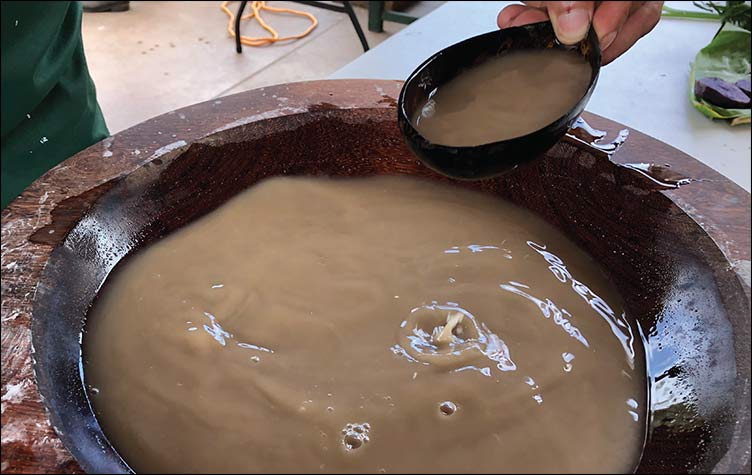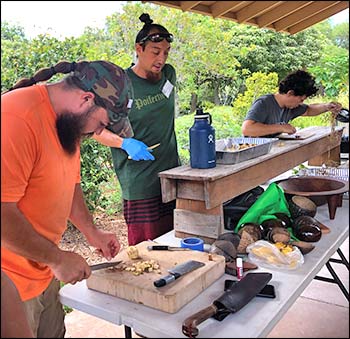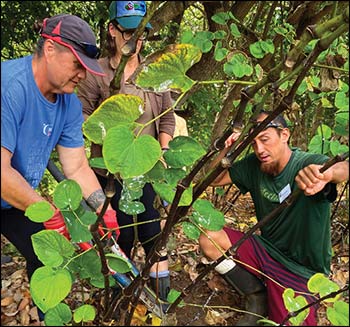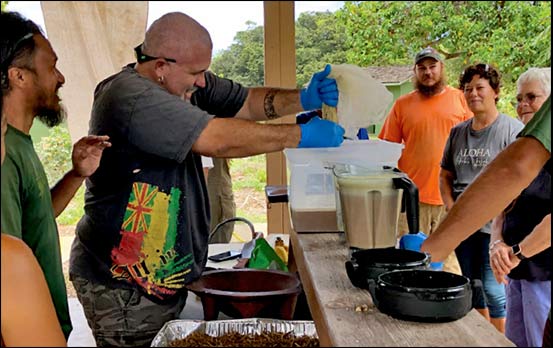‘Awa: Tradition & Wellness
by Aaron Guerrero
Feed with ‘awa so that the spirit may gain strength.

The human body is made up of many different systems working together that can greatly affect our quality of life from how we feel mentally and physically, to how well we are able to perform our activities of daily living. The multiple causes of stress are most likely different now than from those that were felt by humans a hundred years ago. The affects of stress on the human body have been linked to many negative impacts on our brain, muscles, joints, and organs, but cultures of the Pacific had a natural remedy that was cultivated for centuries. Piper methysticum, kava or ‘awa, is the only plant that contains the chemicals known collectively as kavalactones. These chemicals have been found to interact with specific receptors in our brain that serve as pathways to counteract the bodily response to stress. There are six major kavalactones present and according to some research, different strains of ‘awa contain different blends of the six. Although all six contribute to the stress reducing effects, some may present stronger reactions to reducing stress. Current research shows solid evidence of kavalactones reducing anxiety, and more recent studies are showing positive correlations with its anti-inflammatory effects. All these uses were known throughout ancient Oceania and here in Hawai’i, it was a staple crop that was cared for and cultivated for centuries.


In May of 2022, the Gardens hosted an ‘Awa Workshop hosted and taught by Ka’iana Runnels, an avid kalo and ‘awa farmer currently residing on the Big Island. This workshop covered the main differences between the known Hawaiian varieties of ‘awa, as well as the differences between the South Pacific strains of kava. According to his own research, the Hawaiian ‘awa supports a much more calming and controlled affect.
The kavalactone kavain was found in higher concentrations in Hawaiian ‘awa roots than those of the South Pacific. Research supports that kavain has a more profound affinity to the receptors in the brain that reduce anxiety. Ka’iana also shared knowledge of the ancient traditions and practices of ‘awa consumption, as it tied to many different aspects of old Hawai’i from political warfare, business, and even ceremonial worship of major gods. It was evident that ‘awa was considered a sacred plant to the ancient Hawaiians. The growing and preparation of ‘awa is not an easy process.

There are 13 known Hawaiian ‘awa varieties and Maui Nui Botanical Gardens cultivates all of them. Each has their own backstory and ancient uses. Learning about them can become a fascinating journey. Modern science is slowly updating their research to support the positive claims that this plant has on people, but the wisdom of the ancients should never be disregarded. It was discussed in the workshop that Hawai’i may very well be the home to the most refined and purest ‘awa, and scientific research are beginning to support that claim. This notion of ancient elites has a growing theme here in Hawai’i, from arts and crafts to the management of our natural resources. It is possible that the focus on health and wellness could be resourced from the ancients as well. “E hānai ‘awa a ikaika ka makani. Feed with ‘awa so that the spirit may gain strength.”
Location
The Garden is located at 150 Kanaloa Avenue in Kahului, Maui, right across from the War Memorial Stadium.
(808) 249-2798
Hours of Operation
Tuesday through Saturday,
8:00 a.m. – 4:00 p.m.
Closed occasionally for inclement weather and Hawaii State Holidays.
Admission
Members: Free
General: $10
Keiki Under 12: Free
Kama'aina: Free
(with Hawai'i ID)

